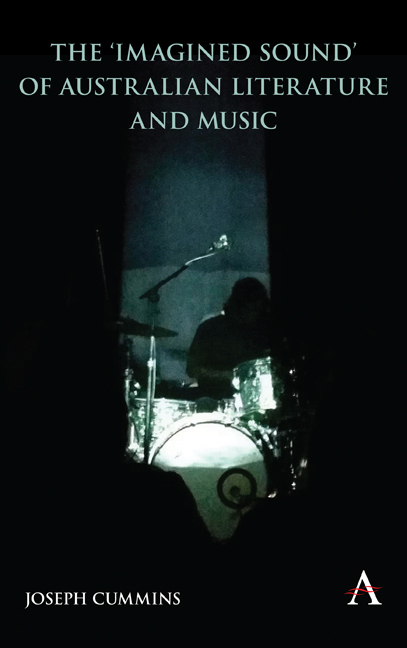Book contents
- Frontmatter
- Contents
- Foreword
- Acknowledgements
- Introduction: Imagined Sound
- Part One Listening to the Continent
- 1 Reimagining ‘The Centre’: Francis Webb's ‘Eyre All Alone’ and David Lumsdaine's Aria for Edward John Eyre
- 2 Midnight Oil: Sounding Australian Rock Around the Bicentenary
- 3 Sound and Silence: Listening and Relation in the Novels of Alex Miller
- Part Two Listening to Islands and Archipelagos
- Part Three Listening to the Continental Archipelago
- Coda
- Notes
- Works Cited
- Index
2 - Midnight Oil: Sounding Australian Rock Around the Bicentenary
from Part One - Listening to the Continent
Published online by Cambridge University Press: 18 September 2019
- Frontmatter
- Contents
- Foreword
- Acknowledgements
- Introduction: Imagined Sound
- Part One Listening to the Continent
- 1 Reimagining ‘The Centre’: Francis Webb's ‘Eyre All Alone’ and David Lumsdaine's Aria for Edward John Eyre
- 2 Midnight Oil: Sounding Australian Rock Around the Bicentenary
- 3 Sound and Silence: Listening and Relation in the Novels of Alex Miller
- Part Two Listening to Islands and Archipelagos
- Part Three Listening to the Continental Archipelago
- Coda
- Notes
- Works Cited
- Index
Summary
Fifteen years after David Lumsdaine's Aria – and twenty-five years after Francis Webb's ‘Eyre All Alone’ – Midnight Oil captured the Australian public imagination by reimagining the centre as ‘The Dead Heart’. The search for the centre became a journey into the monumental red expanse of Uluru – Indigenous country – charged with political urgency. Midnight Oil sounded the centre as a space becoming monumental. From the images of Uluru in their film clip for ‘The Dead Heart’ to their performance on the international stage of the Sydney Olympics closing ceremony, the band injected the national interior with the performative, explosive, multimedia energy of rock music, one of the defining mediums of twentieth-century popular culture. Mapped by Midnight Oil, the centre is more public, more political, more popular, more iconic and more inclusive.
Midnight Oil sit on the fulcrum of the Australian geo-becoming, between the post-war Modernist and nationalist oriented search for the centre, and the post-Mabo, postcolonial reorientation of that journey into the continental interior carried out by Alex Miller and later fully realized by Alexis Wright in Carpentaria in the 2000s. Over a career spanning the late 1970s to the present, The Oil's – like no other rock group in Australian popular music – worked to highlight Australian Indigenous people and, from an environmental perspective, to emphasize the value of Australian place. Following the band's movement from origins to authenticity, in this chapter we navigate from the continental coastline to the centre. In plotting this course, I examine three key moments and musical artefacts: starting with a discussion of Oz rock and the authenticity associated with that genre, I track the band through their groundbreaking 1986 Blackfella/ Whitefella tour of remote Northern Territory and Western Australia, discuss the international success of the 1987 album Diesel and Dust and analyse the film clip for the song ‘The Dead Heart’ from that album. The Sydney Olympic Games closing ceremony performance, where the band made a powerful statement of postcolonial reconciliation that was broadcast internationally, closes the chapter.
Midnight Oil's focus on Australian Indigenous people and the environment, and their wider critique of globalized modernity and capitalistic ideology is imbricated within this series of events.
- Type
- Chapter
- Information
- The 'Imagined Sound' of Australian Literature and Music , pp. 45 - 64Publisher: Anthem PressPrint publication year: 2019



